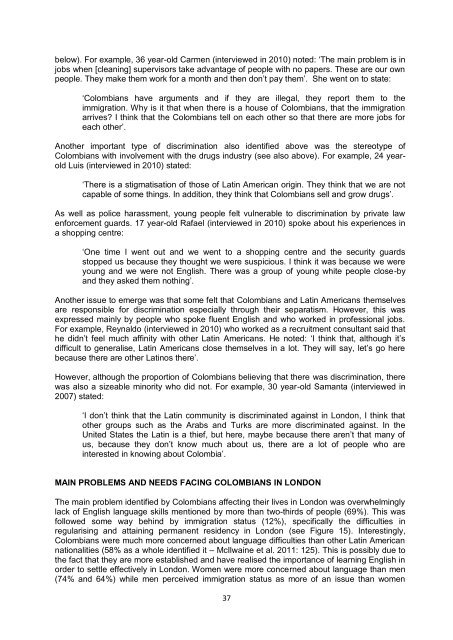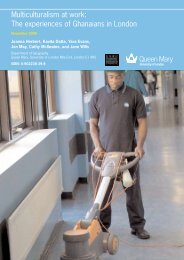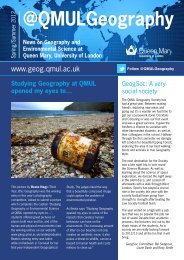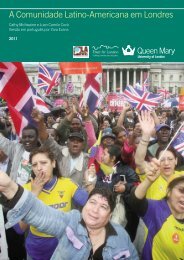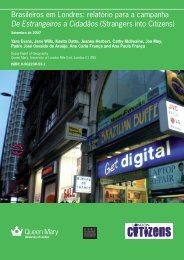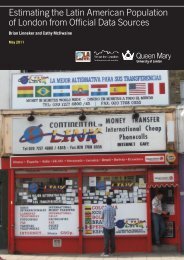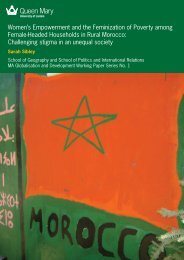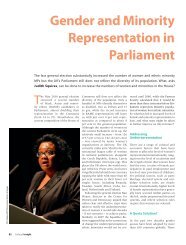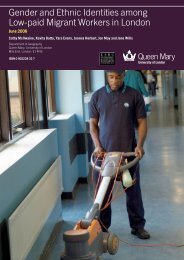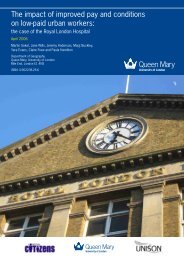The Colombian community in London - Geography - Queen Mary ...
The Colombian community in London - Geography - Queen Mary ...
The Colombian community in London - Geography - Queen Mary ...
- No tags were found...
You also want an ePaper? Increase the reach of your titles
YUMPU automatically turns print PDFs into web optimized ePapers that Google loves.
elow). For example, 36 year-old Carmen (<strong>in</strong>terviewed <strong>in</strong> 2010) noted: „<strong>The</strong> ma<strong>in</strong> problem is <strong>in</strong><br />
jobs when [clean<strong>in</strong>g] supervisors take advantage of people with no papers. <strong>The</strong>se are our own<br />
people. <strong>The</strong>y make them work for a month and then don‟t pay them‟. She went on to state:<br />
„<strong>Colombian</strong>s have arguments and if they are illegal, they report them to the<br />
immigration. Why is it that when there is a house of <strong>Colombian</strong>s, that the immigration<br />
arrives I th<strong>in</strong>k that the <strong>Colombian</strong>s tell on each other so that there are more jobs for<br />
each other‟.<br />
Another important type of discrim<strong>in</strong>ation also identified above was the stereotype of<br />
<strong>Colombian</strong>s with <strong>in</strong>volvement with the drugs <strong>in</strong>dustry (see also above). For example, 24 yearold<br />
Luis (<strong>in</strong>terviewed <strong>in</strong> 2010) stated:<br />
„<strong>The</strong>re is a stigmatisation of those of Lat<strong>in</strong> American orig<strong>in</strong>. <strong>The</strong>y th<strong>in</strong>k that we are not<br />
capable of some th<strong>in</strong>gs. In addition, they th<strong>in</strong>k that <strong>Colombian</strong>s sell and grow drugs‟.<br />
As well as police harassment, young people felt vulnerable to discrim<strong>in</strong>ation by private law<br />
enforcement guards. 17 year-old Rafael (<strong>in</strong>terviewed <strong>in</strong> 2010) spoke about his experiences <strong>in</strong><br />
a shopp<strong>in</strong>g centre:<br />
„One time I went out and we went to a shopp<strong>in</strong>g centre and the security guards<br />
stopped us because they thought we were suspicious. I th<strong>in</strong>k it was because we were<br />
young and we were not English. <strong>The</strong>re was a group of young white people close-by<br />
and they asked them noth<strong>in</strong>g‟.<br />
Another issue to emerge was that some felt that <strong>Colombian</strong>s and Lat<strong>in</strong> Americans themselves<br />
are responsible for discrim<strong>in</strong>ation especially through their separatism. However, this was<br />
expressed ma<strong>in</strong>ly by people who spoke fluent English and who worked <strong>in</strong> professional jobs.<br />
For example, Reynaldo (<strong>in</strong>terviewed <strong>in</strong> 2010) who worked as a recruitment consultant said that<br />
he didn‟t feel much aff<strong>in</strong>ity with other Lat<strong>in</strong> Americans. He noted: „I th<strong>in</strong>k that, although it‟s<br />
difficult to generalise, Lat<strong>in</strong> Americans close themselves <strong>in</strong> a lot. <strong>The</strong>y will say, let‟s go here<br />
because there are other Lat<strong>in</strong>os there‟.<br />
However, although the proportion of <strong>Colombian</strong>s believ<strong>in</strong>g that there was discrim<strong>in</strong>ation, there<br />
was also a sizeable m<strong>in</strong>ority who did not. For example, 30 year-old Samanta (<strong>in</strong>terviewed <strong>in</strong><br />
2007) stated:<br />
„I don‟t th<strong>in</strong>k that the Lat<strong>in</strong> <strong>community</strong> is discrim<strong>in</strong>ated aga<strong>in</strong>st <strong>in</strong> <strong>London</strong>, I th<strong>in</strong>k that<br />
other groups such as the Arabs and Turks are more discrim<strong>in</strong>ated aga<strong>in</strong>st. In the<br />
United States the Lat<strong>in</strong> is a thief, but here, maybe because there aren‟t that many of<br />
us, because they don‟t know much about us, there are a lot of people who are<br />
<strong>in</strong>terested <strong>in</strong> know<strong>in</strong>g about Colombia‟.<br />
MAIN PROBLEMS AND NEEDS FACING COLOMBIANS IN LONDON<br />
<strong>The</strong> ma<strong>in</strong> problem identified by <strong>Colombian</strong>s affect<strong>in</strong>g their lives <strong>in</strong> <strong>London</strong> was overwhelm<strong>in</strong>gly<br />
lack of English language skills mentioned by more than two-thirds of people (69%). This was<br />
followed some way beh<strong>in</strong>d by immigration status (12%), specifically the difficulties <strong>in</strong><br />
regularis<strong>in</strong>g and atta<strong>in</strong><strong>in</strong>g permanent residency <strong>in</strong> <strong>London</strong> (see Figure 15). Interest<strong>in</strong>gly,<br />
<strong>Colombian</strong>s were much more concerned about language difficulties than other Lat<strong>in</strong> American<br />
nationalities (58% as a whole identified it – McIlwa<strong>in</strong>e et al. 2011: 125). This is possibly due to<br />
the fact that they are more established and have realised the importance of learn<strong>in</strong>g English <strong>in</strong><br />
order to settle effectively <strong>in</strong> <strong>London</strong>. Women were more concerned about language than men<br />
(74% and 64%) while men perceived immigration status as more of an issue than women<br />
37


